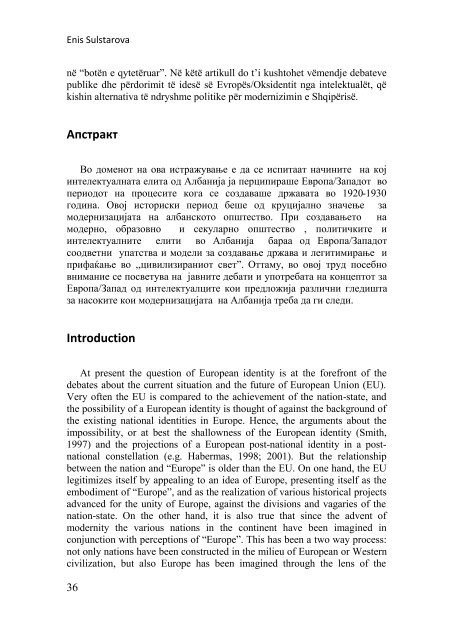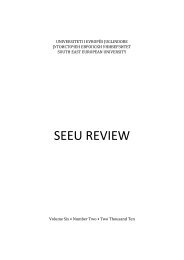SEEU Review vol. 5 Nr. 2 (pdf) - South East European University
SEEU Review vol. 5 Nr. 2 (pdf) - South East European University
SEEU Review vol. 5 Nr. 2 (pdf) - South East European University
You also want an ePaper? Increase the reach of your titles
YUMPU automatically turns print PDFs into web optimized ePapers that Google loves.
Enis Sulstarova<br />
në “botën e qytetëruar”. Në këtë artikull do t’i kushtohet vëmendje debateve<br />
publike dhe përdorimit të idesë së Evropës/Oksidentit nga intelektualët, që<br />
kishin alternativa të ndryshme politike për modernizimin e Shqipërisë.<br />
Апстракт<br />
Во доменот на ова истражување е да се испитаат начините на кој<br />
интелектуалната елита од Албанија ја перципираше Европа/Западот во<br />
периодот на процесите кога се создаваше државата во 1920-1930<br />
година. Овој историски период беше од круцијално значење за<br />
модернизацијата на албанското општество. При создавањето на<br />
модерно, образовно и секуларно општество , политичките и<br />
интелектуалните елити во Албанија бараа од Европа/Западот<br />
соодветни упатства и модели за создавање држава и легитимирање и<br />
прифаќање во ,,цивилизираниот свет”. Оттаму, во овој труд посебно<br />
внимание се посветува на јавните дебати и употребата на концептот за<br />
Европа/Запад од интелектуалците кои предложија различни гледишта<br />
за насоките кои модернизацијата на Албанија треба да ги следи.<br />
Introduction<br />
At present the question of <strong>European</strong> identity is at the forefront of the<br />
debates about the current situation and the future of <strong>European</strong> Union (EU).<br />
Very often the EU is compared to the achievement of the nation-state, and<br />
the possibility of a <strong>European</strong> identity is thought of against the background of<br />
the existing national identities in Europe. Hence, the arguments about the<br />
impossibility, or at best the shallowness of the <strong>European</strong> identity (Smith,<br />
1997) and the projections of a <strong>European</strong> post-national identity in a postnational<br />
constellation (e.g. Habermas, 1998; 2001). But the relationship<br />
between the nation and “Europe” is older than the EU. On one hand, the EU<br />
legitimizes itself by appealing to an idea of Europe, presenting itself as the<br />
embodiment of “Europe”, and as the realization of various historical projects<br />
advanced for the unity of Europe, against the divisions and vagaries of the<br />
nation-state. On the other hand, it is also true that since the advent of<br />
modernity the various nations in the continent have been imagined in<br />
conjunction with perceptions of “Europe”. This has been a two way process:<br />
not only nations have been constructed in the milieu of <strong>European</strong> or Western<br />
civilization, but also Europe has been imagined through the lens of the<br />
36

















